- Home
- Joel Rosenberg
Hero Page 5
Hero Read online
Page 5
A warm wave of dull distant pain washed away the agony, and then dissolved itself. He puffed for his private line to the general. "Shimon, we're taking fire from above."
"How many hit?"
Galil had just caught the edge of the rain of bullets; Moshe Bar-El had been stitched diagonally across the chest. He sprawled on the ground, almost cut in half, fat, broken, yellow worms of intestine peeking out through the crimson mess of his midsection.
Two men beyond him lay broken and bloody, and for the life of him Yitzhak Galil couldn't put names to the broken pieces.
"Three dead; I'm dinged." Keep the pain distant.
"Do I need to replace you?"
Galil took a quick inventory. His leg was still bleeding, the blood running down his khakis and into his boot, but it didn't look like much; probably only cut through the muscle. No spurting—venous, rather than arterial blood.
The piece with the triple bars of a captain on its shoulder was only injured, not out of it.
Besides, he could monitor and control things from here. No. You had to leave decisions for those who were going to have to live with them. "No, Shimon. I'm passing it along." He puffed for Skolnick. "Kelev Twenty—you've got the assault commando; I'm auto-patching you through to the General."
"No need; it's okay, Captain. Got three of them knocked down. Others are retreating toward the road. Estimate a total of fifteen. What do you want me to do?"
You can't pass control of an operation over to somebody who's asking you what to do; the piece named Galil would just have to function as chessmaster a few minutes more.
"That was a Casa helo overhead, possibly circling for another pass," Shimon said. "Chiabrera says another one from the same flight'll be overhead any second; two more in two minutes. They say they can patch me through for direct control in one minute. Peled's got both Hunters ready, busy acquiring. Call it."
The pain was a distant thing—no, it was nothing. A chessmaster didn't feel any pain when one of the pieces was endangered. All he had to do was call the right move.
He puffed for the regimental freak, override mode. "Kelev Twenty to Tel Aviv Ten. Target Casa helo. Perp to the road, eleven o'clock. Green light."
A minute? A minute was an eternity. The autoguns on a Casa attack helo fire upwards of five thousand rounds a minute. Maybe they were supposed to be a friendly force, but there were three men dead on the ground because the assholes hadn't held their fire as told.
And that had nothing to do with it. Not a damn thing. It was just data. A chessmaster didn't have any affection for his pieces; he just had to evaluate the danger and react.
"Tel Aviv Ten. Say again. Request confirmation."
"I said green light, Colonel Peled. You get that fucking piece off my board." He leaned hard against the tree. "Burn the bastard down," he added. But his microphone wasn't on.
"Tel Aviv Ten, roger. Acquired." Peled's voice was crisp and flat. "Rocket away." High overhead, the world exploded into flame and noise that didn't quite drown out Peled's quiet mutter of "Got him," before the colonel shut off his mike.
Good: the enemy was on the run; the friendly forces weren't overhead shooting up his pieces.
Galil puffed for Skolnick. "Kelev Twenty—who'd you leave on flank?"
"Litvak. And it's clear there. We got one whole prisoner, one injured. Leg and wrist wound. Both secured."
"Keep the injured one alive; Shimon needs two."
"Understood. They're pinned down in the ditch across from the burning bus. You want to try for more captures?"
"No. Finish it."
"Will do."
The firing intensified, then started to taper off, punctuated with a triple bang of grenades.
"I think we got all of them," Skolnick said.
The chessmaster named Galil leaned back hard against the smooth bole of the tree. His bad leg couldn't support him and his good leg was getting all distant and vague, like the clumsy fingers that couldn't hold the assault rifle any longer.
He slipped down onto the slimyleaves, the world starting to swim in front of his eyes. He closed them. Just play it blindfold, that was it.
You didn't have to look to see the pieces.
He listened to the babble of voices in his headphones for a few seconds.
"Kelev Twelve Thirty-One. I see three down, none moving."
"Kelev Eleven Eleven." That was Lipschitz. "Burning helo on the ground north of the bend, maybe four hundred meters. No sign of life."
"Kelev One Two Three Three. What are we going to do about Slepak? He—"
"Save it, Twelve Thirty-three."
"—motherfucker froze—"
"This is Kelev One Two Three One. I said, save it."
It looked like it was settling down; it was time to move to cleanup. Galil puffed for All Hands, and found that he still had override mode. "Kelev Twenty to all units. We're. . . ." The world started to go black around him, but he forced it back to gray. "We are staying operational, but it looks like it's almost over. Don't waste ammo. Everybody except fireteam leaders switch to single shot. Designated sharpshooters only are to fire insurance rounds; everybody else to fire only on active targets. Fireteam leaders, use your judgment, but keep it clustered. Medics and medicians to medical duty."
"I've got operational control of the helo overhead," Shimon said. "What do you want from him?"
"We're on cleanup; you take it. I suggest you land him just ahead of the first bus and use him for medevac. You'd better get me a medic, and find somebody else to take over the mopping up."
"Fair enough. I'll take over, now?"
"It's yours, General."
"I've got it. Good job, Yitzhak."
Galil started to say something, but the distant world at the end of the dark tunnel, the dim world surrounding the piece with the triple bars of a captain, the gray world was going black. Maybe he had lost too much blood after all.
Damn.
CHAPTER 5
Mordecai Peled: Cleaning Up
Mordecai Peled kicked through the smoking remains of the roughly square piece of composite. Part of the outer wall of the cabin, maybe, although it was hard to tell. The whole damn thing stank of burning petrochemicals and scorched meat. A scorched fragment of bone stuck up through the wreckage. He nudged it with his toe, but couldn't decide whether it was part of an arm or leg.
He eyed it coldly. That was just something that had happened to get in his way, and he'd knocked it down. That didn't matter at all.
Hey, Casa mamas, teach your boys not to point guns at my boys.
There's some things you have to give up on. Teaching morality, for one.
You can't teach them that it's wrong to run through the streets of Berlin smashing your people's windows and burning their shops. You can't teach them it's evil to herd your people into the Umshlagplatz and load them into cattle cars to be hauled away and boiled down for soap. You can't teach them that it's unjust to wrap your revered teachers in the Torah scroll and burn them alive. You can't teach them it's immoral to wait on an overpass and then, shouting, "Arafat will fuck your sister," throw firebombs at an auto on a Jerusalem road and boil a baby in his mother's womb.
You can, however, teach them that it's unsafe to raise their hand to you and yours.
That was good enough for Mordecai Peled.
The bodies, some still in Casa uniforms—had to save something for the Thousand Worlds observers—scattered across the lightly wooded slope were something else, though: they had him irritated. The bastards had tried to get in his way, and he didn't like that much. But the dozen or so bodies didn't seem a fair trade for what was shaping up to be at least thirty dead Metzadans and five times that many wounded.
There weren't enough Freiheimer bodies in the universe to trade for the least of his people.
But that was personal, not professional. His professional judgment was that the Thirtieth had been fucking lucky.
Seven hundred and fifty men, all except one stripped company orga
nized into a support/transport/medical command and two specialized training detachments, the lot of them ambushed by fifteen well-armed infantrymen, would be expected to take upwards of fifty percent casualties. Well upwards.
Looking at it the other way: if Peled had staged an ambush like this, he would have expected to knock out more than half the buses and kill well over half the men.
Buses. He shook his head. Buses. Not even APC's, although he didn't think much of APCs, not in a combat zone.
He was an old infantryman, and he took the old infantryman's view: the worse place to be in a firefight was a pillbox—but being inside a vee-hicle was almost as bad. If you need a foxhole, you dig one; you don't build it above ground. Putting tracks, wheels or fans underneath it doesn't make it better. Still an above-ground foxhole.
Well, they weren't organized into two fucking training detachments and a transport/support/medical command now: they were now the First Battalion, call sign Haifa, operational in a combat zone.
Peled didn't necessarily like that, but he understood it.
His earphone hissed. "Haifa A One Twenty, err, Haifa A Twenty," Avigdor Cohen said, correcting himself. "That is, Haifa A Twenty for Haifa Twenty. Clear at the streambed."
"Haifa Twenty," Peled said, acknowledging as battalion commander. "Post guards to cover your sector, then move up to the CP, double time." The command post was the spot near the first bus where Shimon was interrogating the prisoners. Not much of a CP, but when in doubt, the command post was where the commander was.
"Haifa A Twenty, you got it," Cohen said, identifying himself yet again as the commander of A Company, First Battalion.
Senior Captain Avigdor Cohen had been on the books as an armor and ordnance repair specialist, not a trainer—Cohen was a lousy teacher, but he was good at getting local arty back online faster and running better than anybody thought possible. Cohen was commanding the hastily improvised A Company now, what there was of it: it was more of a platoon than anything else. Resnick, who would have been Peled's first choice for a combat company commander, was dead in the first bus, along with too many of the support people.
Still, putting Cohen in charge of the company might have been a mistake. Normally, Peled would have preferred Adelberg; Stu had more infantry experience. But Avi Cohen was senior, and he'd handled himself well toward the end of the firefight. Damned if Mordecai Peled was going to jump somebody over his head—not in front of the Casas, particularly not in front of the perverted IG corps they called the II Distacamento de la Fedeltà, the Loyalty Detachment.
Fucking DFs.
As Peled and his team worked the clearing, a pair of the DFs—one male, short and skinny; one female, fat and dumpy—kept them under observation. Idiots. What did the DFs think they were going to do, run off with the bodies?
Peled didn't mind things being done wrong—war is the domain of mistakes—but he didn't like things being done stupid. Command and authority are supposed to flow up and down, not be shoved in from the side by a bunch of official kibitzers who didn't have to live or die with their mistakes.
He sighed. He was getting too old for this, woolgathering when there was work to do. The area was secured; fine. The captives had been pulled out and were up at the road under the control of Shimon and Galil—no, Shimon and Skolnick. The sharp-eyed sergeant was running Kelev for the time being; he'd be glad to be rid of that once Galil was back on his feet.
Peled still had to figure out what to do about staff.
The officer complement of a Metzadan infantry battalion headquarters was supposed to consist of six: a battalion commander, either a colonel or light colonel; an exec, generally a major, who doubled as S3, the ops officer; the deputy S3, generally a captain; and S1, S2, and S4, all lieutenants or captains. Usually there was a senior medician in the rank of a captain, but he was out of the chain of command, in general practice although not in theory. For the time being, Reuven Zucker was very much in the chain of command: he was running Company C, which was busy handling field aid and triage up on the road.
The officer complement of First Bat HQ was supposed to be six; right now, it was Mordecai Peled.
Period. First Bat was operational in theory, and it would fire back if fired upon, but it was headless.
Except for me, he thought, and God knows that I can't carry Bat HQ in my hat.
Peled needed a good battalion staff, and quick. It didn't matter that they would probably reconfigure themselves as a training regiment again tomorrow; right now, right this fucking minute, they were a goddamn infantry battalion, and that's how he had to run it.
In other armies, the senior NCOs, the men who really ran a battalion, could manage about as well without officers as with—sometimes better. But Metzada didn't do things that way, and this was supposed to be a cadre job. While the enlisted complement of the improvised Bat HQ weren't virgins, they weren't ready to run things, not if things got sticky.
Which they already had. Assuming they were going to stay configured this way for even a day or two, Shimon was going to ask Peled for some recommendation on what do about personnel, and Peled hadn't the slightest idea what to tell him.
SOP was to promote from below—and that would be fine for S4, any damn fool could run supply—but who would he get for S3? Peled was acutely conscious that he was good at carrying out someone else's plan, not drafting his own, and he needed a good S3 and deputy S3 or the battalion would be stepping on its dick the next time guns started going off all around them.
At least they were all operational now. Fuck this administrative shit.
Possibly he could raid the Goren's training detachments for some officers. Maybe; he'd have to think about it.
He didn't know what to do about the personnel problem, but Mordecai Peled had always gone by the simple rule of if you didn't know what to do next, figure out what to do now.
Establishing and clearing a defensive perimeter was easy and clean, and besides, Cohen could use the practice of moving a company, even a platoon-sized company, through the slimy woods. There was every indication that that would come in handy.
This was supposed to be a simple cadre and command job: finish the training of a division made of green recruits and recycled officers and noncoms—mostly misfits who had burned out in the line. The senior staff—battalion-level staff and up—would take that division into the field for ten days of combat and then turn it all over to their Casa deputies.
It still could be a cadre and command job, but Peled had a suspicion about that. He hadn't liked the look in Shimon's eye. Shimon didn't keep Mordecai Peled around as chief of staff because he needed a buffer between himself and his top officers; Shimon wanted a spare combat commander handy, somebody whose mind as well as his reflexes could function when it all hit the fan.
And, maybe, who could supervise the cleanup afterward.
Mordecai Peled sighed, then returned to work, under the watchful gaze of the two Distacamento Fedeltà onlookers.
The next body was clearly dead; the right foot was blown clear off, and it had bled out. He chalked an x on it and moved on.
One of the unchalked Freiheimer bodies wasn't visibly injured enough, although it was lying face down and it had soiled itself. Probably dead—the only thing more amazing than how much punishment a human body could take without dying was how little damage could kill—but nobody under Peled's command had ever been killed by a supposedly dead man. Seeing to that wasn't a particularly ugly job, not compared with what you sometimes had to do, but it was disagreeable enough that Peled didn't want to delegate it, not when he could do it himself.
He thumbed his Barak back to single-shot and mechanically raised it to his shoulder. The front sight ring had broken loose during the fight, but the body was only two meters away; even without working sights, he should be able to put a bullet in a spine at that distance.
"Haifa Twenty to All Hands," he said on All Hands One, override mode. "Barak rifle, firing one."
He squeezed the trigger
, and was rewarded by a jerk, a bang and a gout of flying flesh and gore. But just to the right of the spine, dammit.
You're getting old, old man. Couldn't even kill a dead man right.
Still, while the hole was bloody, it wasn't bleeding. There was no heart pumping; Peled had just killed another dead man.
He thumbed his rifle back to safe and handed it to his clerk/driver/bodyguard, who slung it over his own shoulder. He was still able to work his stylo and notebook, although he did look a bit hunched over.
Peled pulled on his blood-spattered field gloves as he knelt at the corpse's side. He drew his knife. "White male, brown-haired, apparently," he said, slashing down at a hunk of hair, then examining the roots carefully as he laid the scalp open to white bone. "True dark." One of the others had had dyed hair.
He slashed off the uniform shirt and stuffed it into the sample bag at the left side of his waist. The shirt looked like a real Casa uniform blouse. Maybe it was, and maybe it wasn't. Ditto for the undershirt. It was a normal Casa tee.
He chalked the corpse.
Ezer Laskov, the regimental S2, hadn't been on the commo net before, but he wasn't among the RHQ casualties, far as Peled knew. Maybe he was back on. Peled flipped the identity switch at his belt—making him Tel Aviv Ten, the regimental chief of staff again, and not Haifa Twenty, the First Battalion commander—and bulled into the RHQ freak.
"—and that's ten, repeat ten—"
"Tel Aviv Ten for Tel Aviv Two Twenty."
"Laskov. What is it, Mordecai?"
"Tel Aviv Ten. What's the standard issue Freiheim undershirt?" Most Metzadan Intelligence officers had eidetic memories, although Laskov's was only close.
"Err, that'll be A-shirts for three-season wear—ten or fifteen-weight—long shirts for winter. Polysil for officers, cotton for the enlisted."
"Tel Aviv Ten. Casa?"
"Cotton tees. I don't have manufacturer data."

 The Road Home
The Road Home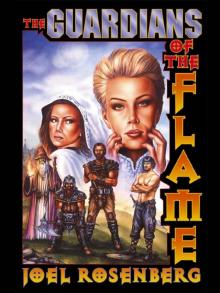 The Sword and the Chain
The Sword and the Chain Not Quite Scaramouche
Not Quite Scaramouche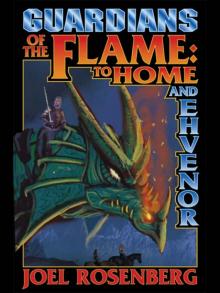 Guardians of The Flame: To Home And Ehvenor (The Guardians of the Flame #06-07)
Guardians of The Flame: To Home And Ehvenor (The Guardians of the Flame #06-07) The Silver Stone
The Silver Stone Hero
Hero Not For Glory
Not For Glory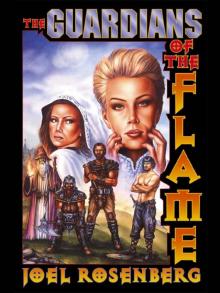 The Sleeping Dragon
The Sleeping Dragon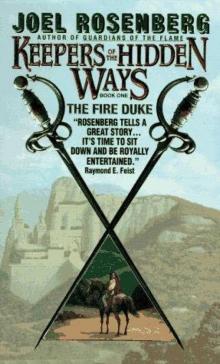 The Fire Duke
The Fire Duke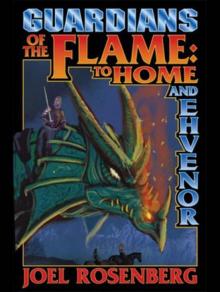 Guardians of The Flame: To Home And Ehvenor (Guardians of the Flame #06-07)
Guardians of The Flame: To Home And Ehvenor (Guardians of the Flame #06-07)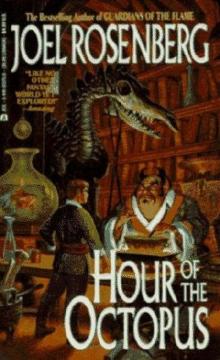 Hour of the Octopus
Hour of the Octopus Emile and the Dutchman
Emile and the Dutchman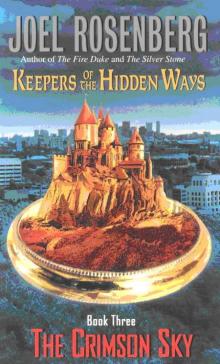 The Crimson Sky
The Crimson Sky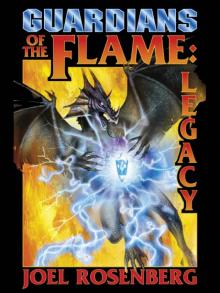 Guardians of the Flame - Legacy
Guardians of the Flame - Legacy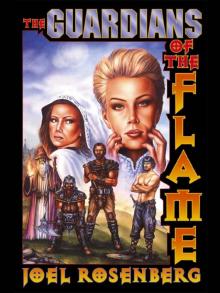 The Silver Crown
The Silver Crown Not Exactly The Three Musketeers
Not Exactly The Three Musketeers Not Really the Prisoner of Zenda
Not Really the Prisoner of Zenda